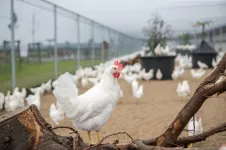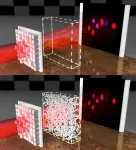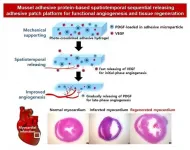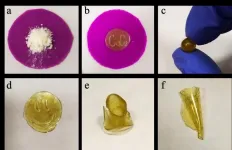Pandemic-inspired discoveries: New insect species from Kosovo named after the Coronavirus
2021-04-12
(Press-News.org) While the new Coronavirus will, hopefully, be effectively controlled sooner rather than later, its latest namesake is here to stay - a small caddisfly endemic to a national park in Kosovo that is new to science.
Potamophylax coronavirus was collected near a stream in the Bjeshkët e Nemuna National Park in Kosovo by a team of scientists, led by Professor Halil Ibrahimi of the University of Prishtina. After molecular and morphological analyses, it was described as a caddisfly species, new to science in the open-access, peer-reviewed Biodiversity Data Journal.
Ironically, the study of this new insect was impacted by the same pandemic that inspired its scientific name. Although it was collected a few years ago, the new species was only described during the global pandemic, caused by SARS-CoV-2. Its name, P. coronavirus, will be an eternal memory of this difficult period.
In a broader sense, the authors also wish to bring attention to "another silent pandemic occurring on freshwater organisms in Kosovo's rivers," caused by the pollution and degradation of freshwater habitats, as well as the activity increasing in recent years of mismanaged hydropower plants. Particularly, the river basin of the Lumbardhi i Deçanit River, where the new species was discovered, has turned into a 'battlefield' for scientists and civil society on one side and the management of the hydropower plant operating on this river on the other.
The small insect order of Trichoptera, where P. coronavirus belongs, is very sensitive to water pollution and habitat deterioration. The authors of the new species argue that it is a small-scale endemic taxon, very sensitive to the ongoing activities in Lumbardhi i Deçanit river. Failure to understand this may drive this and many other species towards extinction.
Interestingly, in the same paper, the authors also identified a few other new species from isolated habitats in the Balkan Peninsula, which are awaiting description upon collection of further specimens. The Western Balkans and especially Kosovo, have proved to be an important hotspot of freshwater biodiversity. Several new insect species have been discovered there in the past few years, most of them being described by Professor Halil Ibrahimi and his team.
INFORMATION:
Original source:
Ibrahimi H, Bilalli A, Vitecek S, Pauls SU, Erzinger F, Gashi A, Grapci Kotori L, Geci D, Musliu M, Kasumaj E (2021) Potamophylax coronavirus sp. n. (Trichoptera: Limnephilidae), a new species from Bjeshkët e Nemuna National Park in the Republic of Kosovo, with molecular and ecological notes. Biodiversity Data Journal 9: e64486. https://doi.org/10.3897/BDJ.9.e64486
[Attachments] See images for this press release:
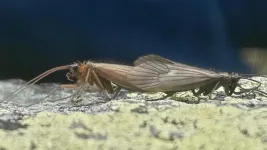
ELSE PRESS RELEASES FROM THIS DATE:
2021-04-12
New research shows that people who experience big dips in blood sugar levels, several hours after eating, end up feeling hungrier and consuming hundreds more calories during the day than others.
A study published today in Nature Metabolism, from PREDICT, the largest ongoing nutritional research program in the world that looks at responses to food in real life settings, the research team from King's College London and health science company ZOE (including scientists from Harvard Medical School, Harvard T.H. Chan School of Public Health, Massachusetts General Hospital, the University of Nottingham, Leeds University, and Lund University ...
2021-04-12
Between 2018 and 2020, 1,4 million EU citizens signed the petition 'End the Cage Age', with the aim of ending cage housing for farm animals in Europe. In response to this citizens initiative, the European Parliament requested a study by Utrecht University researchers on the possibilities to end cage housing. On 13 April, the scientists will present their report 'End the Cage Age - Looking for Alternatives' to the European Parliament.
In the report, behavioural biologists, animal scientists, veterinarians and ethicists from Utrecht University's Faculty of Veterinary Medicine analysed the available scientific literature on alternatives to cage housing. "Our focus was on laying hens and pigs" says Bas Rodenburg, Professor of Animal Welfare at Utrecht University. "Because these ...
2021-04-12
Many women "risk" allowing natural grey hair to show in order to feel authentic, a new study shows.
Researchers from the University of Exeter surveyed women who chose not to dye their grey hair, and found a "conflict" between looking natural and being seen as competent.
Participants in the study - mostly from English-speaking countries - belonged to online groups whose members allow their natural grey hair to show, and the researchers noted "solidarity and sisterhood" among these women.
"We are all constrained by society's norms and expectations when it comes to appearance, but expectations are more rigorous for women - especially older women," said lead author Vanessa Cecil, of the University of Exeter.
"The 'old woman' is an undesirable character in Western societies, being seen ...
2021-04-12
Why is sugar not transparent? Because light that penetrates a piece of sugar is scattered, altered and deflected in a highly complicated way. However, as a research team from TU Wien (Vienna) and Utrecht University (Netherlands) has now been able to show, there is a class of very special light waves for which this does not apply: for any specific disordered medium--such as the sugar cube you may just have put in your coffee--tailor-made light beams can be constructed that are practically not changed by this medium, but only attenuated. The light beam penetrates the medium, and a light pattern arrives on the other ...
2021-04-12
Blood vessels deliver nutrients and oxygen to each organ in our body. They are difficult to completely restore to their original conditions once damaged by myocardial infarction or severe ischemic diseases. This is because various angiogenic growth factors must be applied sequentially in order to restore the vascular structure. Recently, a research team at POSTECH has bioengineered a novel adhesive patch platform that can efficiently deliver blood vessel-forming growth factors spatiotemporally using mussel adhesive protein (MAP), a bio-adhesive material that is made from mussels harmless to humans.
A POSTECH research team led by Professor Hyung Joon ...
2021-04-12
Squirrels and other tree-dwelling rodents evolved to have bigger brains than their burrowing cousins, a study suggests.
This greater brain power has given them key abilities needed to thrive in woodland habitats, including better vision and motor skills, and improved head and eye movements, researchers say.
Scientists have shed light on how the brains of rodents - a diverse group that accounts for more than 40 per cent of all mammals - have changed since they evolved around 50 million years ago.
Few studies looking into factors affecting brain size in mammals have taken account ...
2021-04-12
New Orleans, LA - A study led by Hui-Yi Lin, Ph.D., Professor of Biostatistics, and a team of researchers at LSU Health New Orleans Schools of Public Health and Medicine has found that adequate levels of five antioxidants may reduce infection with the strains of the human papillomavirus (HPV) associated with cervical cancer development. Findings are published in the Journal of Infectious Diseases.
Although previous studies have suggested that the onset of HPV-related cancer development may be activated by oxidative stress, the association had not been clearly understood. This study evaluated associations between 15 antioxidants and vaginal HPV infection status -- no, low-risk, and oncogenic/high-risk HPV (HR-HPV) -- in 11,070 women aged 18-59 who participated ...
2021-04-12
In 2018, Pompeu Fabra University launched its Planetary Wellbeing initiative, a long-term institutional strategy spurred by the United Nations Sustainable Development Goals (SDG) and based on the Planetary Health project promoted by the Rockefeller Foundation and The Lancet.
Fifteen academics and public officials, led by the three directors of the initiative, Josep Maria Antó, scientific director of ISGlobal; Josep Lluís Martí, UPF vice-rector for innovation projects, and Jaume Casals, UPF rector, are the authors of an academic article published in the journal ...
2021-04-12
Cancer is one of the top causes of death worldwide. The cancer burden is related not only to genetic predisposition, but also to environmental pollution and socioeconomic factors such as lifestyle. Consequently, the burden of this disease is not uniform across all countries. In fact, the public health of China, a country known for the rapid change in its development status in the last few decades, has undergone a paradigm shift with respect to cancer incidence and mortality.
To better understand the cancer burden of the country, a team of researchers from Chinese Academy of Medical Sciences and Peking Union Medical College reviewed the data of GLOBOCAN 2020, an online database of cancer incidence and mortality compiled by the International Agency for Research ...
2021-04-12
Researchers at the Laboratory of Cluster Catalysis at St Petersburg University have synthesised polymers from biomass. What makes them different is that they can be easily recycled.
Today, our life is simply unthinkable without polymers. Plastics, fibres, films, paint and lacquer coating - they are all polymers. We use them both in our everyday life and in industry. Yet the goods made from polymers, e.g. bottles, bags, or disposable tableware, are used just once or for a short period of time before they are thrown away. Due to the chemical compounds that they may release during recycling, they pose a real threat to our environment.
There ...
LAST 30 PRESS RELEASES:
[Press-News.org] Pandemic-inspired discoveries: New insect species from Kosovo named after the Coronavirus

